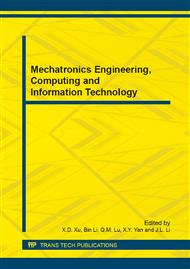[1]
J. Kennedy and R.C. Eberhart. Particle swarm optimization, Proceedings of IEEE International Conference on Neural Networks, pp.1942-1948, (1995).
Google Scholar
[2]
Y. Shi and R.C. Eberhart. A modified particle swarm optimizer,. Proceedings of IEEE International Conference on Evolutionary Computation, p.69–73, (1998).
DOI: 10.1109/icec.1998.699146
Google Scholar
[3]
M. Clerc. The swarm and the queen: Towards a deterministic and adaptive particle swarm optimization,. Proceedings of Congress on Evolutionary Computation, p.1951–1957, (1999).
DOI: 10.1109/cec.1999.785513
Google Scholar
[4]
J. Sun , B. Feng, and W. Xu. Particle swarm optimization with particles having quantum behavior,. Proceedings of Congress on Evolutionary Computation, p.326–331, (2004).
DOI: 10.1109/cec.2004.1330875
Google Scholar
[5]
J. Sun , B. Feng, and W. Xu. A global search strategy of quantum-behaved particle swarm optimization,. Proceedings of IEEE Conference on Cybernetics and Intelligent Systems, p.111–116, (2004).
DOI: 10.1109/iccis.2004.1460396
Google Scholar
[6]
D Zhou, J Sun, Choi-Hong Lai, Wenbo Xu, Xiaoguang Lee: An improved quantum-behaved particle swarm optimization and its application to medical image registration[J]. Int. J. Comput. Math. 2011, 88(6): 1208-1223.
DOI: 10.1080/00207160.2010.499934
Google Scholar
[7]
Jun Sun, Wei Fang, Xiaojun Wu, Zhenping Xie, Wenbo Xu: QoS multicast routing using a quantum-behaved particle swarm optimization algorithm[J]. Eng. Appl. of AI 24(1), 2011: 123-131.
DOI: 10.1016/j.engappai.2010.08.001
Google Scholar
[8]
J. Sun, W. Fang, X. Wu, P. Vasile, W. Xu. Quantum-behaved particle swarm optimization analysis of individual particle behavior and parameter selection,. Evolutionary computation, 20(3), 349-39, (2012).
DOI: 10.1162/evco_a_00049
Google Scholar
[9]
J. Sun, W. Xu, and J. Liu. Parameter selection of quantum-behaved particle swarm optimization,. Advances in Natural Computation, pp.543-52, (2005).
DOI: 10.1007/11539902_66
Google Scholar
[10]
M. Xi, J. Sun, and W. Xu. An improved quantum-behaved particle swarm optimization algorithm with weighted mean best position,. Applied Mathematics and Computation, vol. 205(2), pp.751-9, (2008).
DOI: 10.1016/j.amc.2008.05.135
Google Scholar
[11]
W. Fang, J. Sun, and W. Xu. Improved quantum-behaved particle swarm optimization algorithm based on differential evolution operator and its application,. Journal of System Simulation, vol. 20(24), pp.6740-6744, (2008).
Google Scholar
[12]
W. Fang. Swarm intelligence and its application in the optimal design of digital filters, PHD thesis, (2008).
Google Scholar
[13]
Sutton R. S., Barto A. G., Reinforcement learning: An introduction[M]. Cambridge: MIT Press, (1998).
Google Scholar


